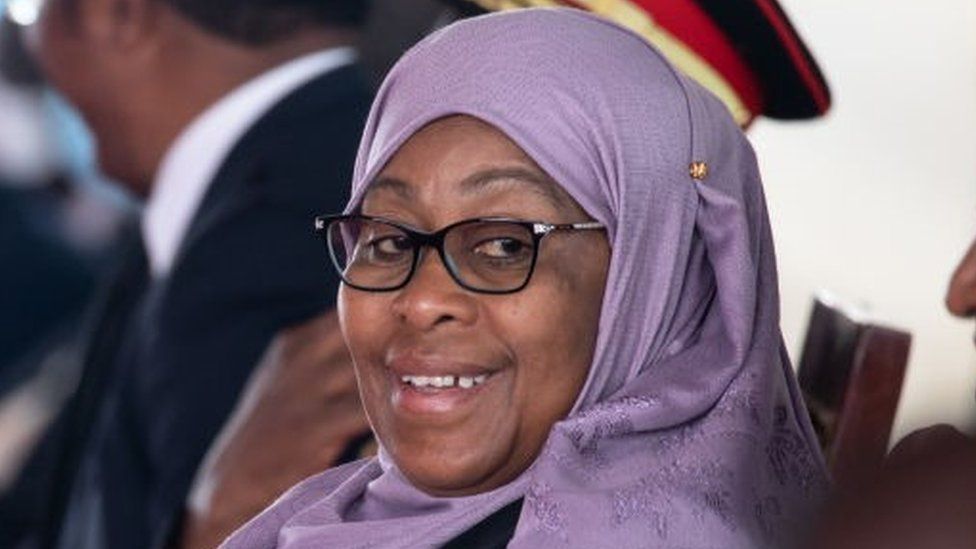Tanzania, a country of about 60 million people in East Africa, has a new leader: Samia Suluhu Hassan. She became the president of Tanzania on March 19, 2021, following the death of her predecessor, John Magufuli. She is the first woman to hold the highest office in the country, and the second woman to be a head of state in the East African Community, after Burundi’s Sylvie Kinigi.
Table of Contents
ToggleWho is Samia Suluhu Hassan?
Samia Suluhu Hassan was born on January 27, 1960, in Zanzibar, a semi-autonomous archipelago that is part of Tanzania. She grew up in a modest family, as her father was a teacher and her mother was a housewife. She completed her secondary education in 1977, and then worked as a clerk in various government offices.
She married Hafidh Ameir, an agricultural officer, in 1978, and they have four children. One of their daughters, Wanu Hafidh Ameir, is a member of the Zanzibar House of Representatives.
Hassan pursued higher education while working and raising her family. She obtained several certificates and diplomas in public administration, economics, and community development from various institutions in Tanzania and abroad. She earned her master’s degree in community economic development from the Open University of Tanzania and Southern New Hampshire University in the United States in 2005.
How did she enter politics?
Hassan joined the ruling party, Chama Cha Mapinduzi (CCM), in 1986, and became active in its women’s wing. She was elected as a member of the Zanzibar House of Representatives in 2000, and was appointed as a minister by then-President Amani Karume. She served as the minister of tourism, trade and investment until 2010.
In 2010, she was elected as a member of the National Assembly of Tanzania, representing the Makunduchi constituency in Zanzibar. She was also appointed as the minister of state for union affairs by then-President Jakaya Kikwete. In 2014, she was elected as the vice-chairperson of the Constituent Assembly that was tasked with drafting a new constitution for Tanzania.
In 2015, she was nominated by CCM as the running mate of John Magufuli, who was seeking to become the president of Tanzania. They won the election with 58% of the vote, and Hassan became the first female vice-president of Tanzania. She was also the first vice-president from Zanzibar since the union between Tanganyika and Zanzibar was formed in 1964.
She was re-elected as the vice-president in 2020, along with Magufuli, who secured his second term with 84% of the vote. However, Magufuli died on March 17, 2021, after suffering from heart complications. According to the constitution of Tanzania, Hassan succeeded him as the president and took oath on March 19, 2021.
What are her achievements and challenges?
As the president of Tanzania, Hassan has inherited a country that faces many challenges and opportunities. She has vowed to continue the legacy of Magufuli, who was known for his anti-corruption crusade and his ambitious infrastructure projects. However, she has also shown signs of being more open and democratic than her predecessor, who was criticized for his authoritarian tendencies and his denial of the COVID-19 pandemic.
Hassan has taken steps to address the COVID-19 situation in Tanzania, which had been largely ignored by Magufuli. She has formed a special committee of experts to advise her on how to deal with the virus and its impact on the economy and society. She has also urged Tanzanians to follow preventive measures such as wearing masks and social distancing. She has also expressed interest in joining the COVAX facility that provides vaccines to low- and middle-income countries.
Hassan has also reached out to regional and international partners to strengthen Tanzania’s relations with them. She has visited Kenya, Uganda, Rwanda, South Africa, Zambia, Malawi, Mozambique, Burundi and Ethiopia since becoming president. She has also hosted several foreign dignitaries in Tanzania, including French President Emmanuel Macron and Indian Prime Minister Narendra Modi.
Hassan has also made history by becoming the first Tanzanian president to address a joint session of parliament in Dodoma, the capital city. She has also appointed several women to key positions in her cabinet and administration.
However, Hassan also faces some challenges and criticisms from various quarters. Some CCM members have questioned her loyalty to Magufuli’s vision and policies. Some opposition leaders have accused her of being a puppet of the CCM elite. Some religious groups have expressed concern over her stance on social issues such as abortion and homosexuality. Some activists have demanded more reforms and freedoms in the country.
Hassan has also faced some security threats, such as an assassination attempt on her motorcade in Dodoma in July 2021, and a bomb blast near her residence in Dar es Salaam in August 2021. She has also faced some health issues, such as undergoing surgery for a hernia in September 2021.
Conclusion
Samia Suluhu Hassan is a trailblazer and a role model for many women and girls in Tanzania and beyond. She is the first woman to lead the East African nation, and has shown her competence and charisma in handling the affairs of the state. She has also demonstrated her willingness to embrace change and dialogue, while maintaining stability and continuity. She has a lot of expectations and responsibilities on her shoulders, as she seeks to steer Tanzania towards a prosperous and peaceful future.









